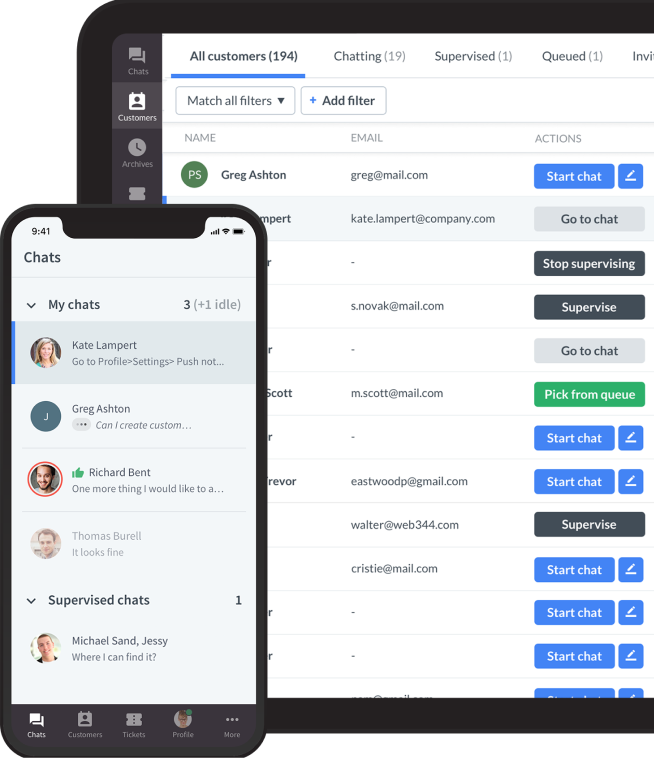Showing top 0 results 0 results found
Showing top 0 results 0 results found

Effective communication with customers isn't just a bonus — it's essential.
Customer communication involves every interaction your business has with clients, from support tickets to promotional emails.
The way your company communicates with your customers has become more crucial than ever. This transformation in communication methods is driven by advancements in technology and changing customer expectations.
In this article, I'll explore the nuts and bolts of customer communication management (CCM), a strategy that helps businesses organize and optimize these interactions.
I’ll look at the role CCM plays in modern businesses, why it’s critical for success, and provide you with some handy tips and tools for effective CCM in 2025.
What is customer communication management?
Customer communication management, or CCM, refers to the strategic approach to managing all communications with customers. It encompasses various forms of communication channels such as emails, live chats, phone calls, and social media interactions.
The goal of CCM is to streamline and enhance how businesses communicate with customers, ensuring that every interaction is timely, consistent, and personalized.
This approach helps manage day-to-day communications and shapes the overall customer experience by making it more engaging and satisfying.
What is the role of CCM in modern business operations?
Customer communication management has transformed into a critical component of modern business operations.
CCM systems help businesses consolidate all customer interactions into one platform. This centralization makes it easier for customer service teams to track conversations and ensures no customer query goes unanswered.
By automating routine inquiries with tools like automated knowledge base responses, CCM allows customer service agents to focus on more complex issues. This way, you can speed up response times while improving the overall efficiency of your team.
Modern CCM solutions enable businesses to personalize communication based on customer data. This personalized approach ensures that communications are relevant to each customer’s needs and preferences, enhancing the customer's journey and building deeper customer relationships.
Why is effective CCM so crucial for businesses?
Effective customer communication management is crucial for businesses for several reasons.
Firstly, it significantly boosts customer satisfaction and retention. When customers receive timely and relevant responses, their overall satisfaction increases, making them more likely to return and engage in repeat business. Secondly, CCM enhances brand reputation and growth. Positive customer interactions help build a favorable brand image, encouraging customers to recommend the business to others, which drives growth.
Moreover, CCM provides data-driven insights. Tools used in CCM gather data from various communication channels, offering businesses valuable insights into customer preferences, behavior, and feedback. These insights are essential for making informed decisions that improve the customer experience.
Additionally, effective communication strengthens customer relationships by fostering trust and loyalty. By consistently addressing customer concerns and valuing their feedback, businesses can build strong, long-lasting relationships with their customers.
Lastly, CCM improves operational efficiency. It streamlines communication processes, reduces the workload on customer service teams, and minimizes errors. This efficiency enhances the customer experience and lowers operational costs, benefiting the business as a whole.
Six common issues faced by businesses in managing customer communications

Navigating the waters of customer communications can be tricky. Even with the best intentions, businesses often stumble upon several roadblocks that can frustrate both customers and customer service teams.
Let’s explore six common challenges businesses face in their quest to perfect their customer communication strategy.
1. Inconsistent messaging across channels
In today’s omnichannel world, a customer might start a conversation on social media and finish it via email. Inconsistencies in responses or tone across these channels can confuse customers and harm the brand’s credibility.
Imagine a customer receiving conflicting information about a product return policy on different platforms—such confusion can significantly erode customer trust.
2. Delayed response times
When customer inquiries pile up, response times can lag. This is particularly critical in industries where timely responses are crucial, like healthcare or financial services. Customers expect quick replies, and delays can lead them to feel undervalued, pushing them towards competitors.
3. Lack of personalization
A generic response to a specific query can feel cold and detached. For instance, if a customer who has been with a service for years receives the same treatment as a new customer, it shows a lack of recognition and appreciation for customer loyalty, potentially weakening customer engagement.
4. Poorly trained staff
When customer service communication is weak because of insufficient training, the quality of interaction suffers. A scenario where a customer service agent is unable to resolve basic issues or answer common questions can lead to customer dissatisfaction and a tarnished reputation.
5. Over-reliance on automated responses
While self-service options and automated knowledge base responses are excellent for handling standard inquiries, overusing them can make customers feel unimportant. There's a delicate balance to strike. Too much automation can make communications feel impersonal and frustrate customers who need human interaction.
6. Inadequate use of customer feedback
Businesses often collect feedback but fail to act on it. This oversight can stall improvements in products and services, and customers who see their suggestions perpetually ignored might feel undervalued and less inclined to engage with or remain loyal to a brand.
Tips for improving customer communication

Enhancing how you communicate with customers can transform their experience and boost their loyalty to your brand.
Here are practical tips for refining your customer communication strategy, followed by concrete examples to help you implement these strategies effectively.
Personalization
Personalization involves tailoring your communication to meet the unique needs and preferences of each customer. This approach shows customers that you recognize them as individuals, which can significantly enhance their engagement and loyalty.
- Customized emails: Use customer data to send personalized emails that address customers by name and reference their previous interactions or purchases. For instance, send a birthday discount or a special offer on the anniversary of their first purchase.
- Tailored recommendations: Implement algorithms that analyze purchase history to suggest relevant products or services. This could be as simple as recommending a new book in a series they have bought before or a complementary accessory for a recently purchased product.
- Interactive profiles: Allow customers to create and customize their profiles on your platform. Use this information to adjust the content they see, making it more relevant to their interests and past behavior.
Responsiveness
Being responsive means answering customer inquiries quickly and accurately. This reassures customers that they are valued and their concerns are taken seriously, which is crucial for building trust and satisfaction.
- Automated acknowledgments: Set up automated responses that immediately acknowledge customer inquiries and provide an estimated time for a follow-up. This keeps customers informed and reduces anxiety about being ignored.
- Prioritized queries: Use a customer service system that categorizes and prioritizes inquiries based on urgency and complexity. For example, urgent support tickets can be flagged for immediate response, while less critical ones are queued accordingly.
- Extended support hours: Offer extended or 24/7 customer support through various channels like live chat or social media to ensure that help is available whenever customers need it.
Clarity and consistency
Clarity and consistency ensure that no matter how or where a customer interacts with your brand, they receive the same message and quality of response. This uniformity helps to prevent confusion and solidify your brand’s reliability.
- Standardized messaging templates: Develop a set of templates for common responses that all team members can use. This helps maintain a consistent tone and style across all communications.
- Regular training: Conduct regular training sessions for your customer service team to improve communication skills and ensure everyone is updated on the latest communication guidelines and product information.
- Unified communication platforms: Utilize a single platform to manage all customer communications, ensuring that all messages are consistent regardless of the channel—be it email, chat, or phone.
Use of automation and AI
Automation and AI can streamline communication processes, making them more efficient and effective. These technologies help manage high volumes of interactions without sacrificing the quality of service.
- Chatbots for routine inquiries: Deploy AI-driven chatbots that can handle common questions and tasks, like tracking an order or answering FAQs. This allows human agents to focus on more complex issues.
- Predictive customer service: Use AI to analyze customer behavior and predict potential issues before they arise. For example, if a customer frequently checks the status of an order, the system might automatically send updates about their shipments.
- Personalized AI recommendations: Integrate AI tools that analyze customer data to provide personalized recommendations directly through chat interfaces or during support calls.
Top tools for customer communication management in 2025
Implementing the tips we just discussed can be seamlessly done with the help of some amazing customer communication management software that are designed to streamline and enhance customer communications.
Let’s explore some of the best tools that can level up your customer communication management game in 2025:
1. LiveChat

LiveChat offers a comprehensive suite designed to simplify communication between businesses and their customers. Perfect for businesses aiming to improve their customer service and sales capabilities, LiveChat integrates a variety of communication channels into one platform, making it easier to maintain a consistent and professional customer communication strategy.
Key features and how they can help in effective CCM
- Chat tools: Including features like canned responses, message sneak-peek, and rich messages, LiveChat allows customer service teams to communicate more efficiently and effectively. Canned responses speed up interaction times, while message sneak-peek gives agents a preview of what the customer is typing before the message is sent.
- Omnichannel communication: LiveChat supports various messaging channels like SMS, email, social media platforms, and in-chat voice/video, ensuring that businesses can meet their customers wherever they are.
- Automation and AI: With features like chatbots and AI-driven responses, LiveChat enables businesses to quickly handle common queries, freeing agents to tackle more complex issues. This use of technology ensures the accuracy and consistency of customer communication.
- Customization and integration: The platform can be customized to fit any business's visual and operational style and integrates seamlessly with over 200 other business tools. This flexibility improves the customer journey by providing a unified experience across all touchpoints.
2. TrueDialog

TrueDialog provides a robust text messaging service that specializes in facilitating direct and effective communication between businesses and their customers.
This customer communication management software is particularly powerful for enterprises looking for a scalable and integrated texting solution.
Key features and how they can help in effective CCM
- Direct 1:1 messaging: Enables personalized, two-way conversations at scale. This feature is crucial for maintaining detailed and individualized communication with customers, enhancing both consumer communication and customer trust.
- Mass texting with two-way SMS: Allows businesses to send bulk messages while still enabling recipients to reply, which can be particularly useful for announcements or widespread customer service notifications.
- Integrated multi-channel capability: TrueDialog integrates SMS with other communication channels like email and social media, allowing for consistent and cohesive communication strategies across all platforms. This ensures that the message remains clear and unified, no matter how the customer chooses to communicate.
3. Drift

Drift is not just a messaging platform; it's a comprehensive tool designed to personalize and enhance email communication throughout the customer journey.
From initial contact to ongoing engagement, Drift uses conversational marketing to ensure that every email sent feels tailor-made for the recipient. This approach can drastically improve customer retention and satisfaction.
Key features and how they can help in effective CCM
- Personalized email campaigns: Drift provides tools to create dynamic email content that resonates with each recipient. This personal touch can strengthen customer relationships and improve communication outcomes.
- Behavior-triggered emails: By monitoring customer interactions and behaviors, Drift can trigger emails based on specific actions taken by the customer. For example, if a customer abandons a shopping cart, an email can be automatically sent to encourage them to complete their purchase.
- A/B testing for emails: Drift allows you to test different versions of your emails to see which one performs better. This means you can continuously improve your emails to ensure they are as effective as possible in communicating with your customers.
Improve customer communication with LiveChat
Effective customer communication management is pivotal for any business aiming to enhance customer satisfaction, strengthen customer relationships, and improve overall communication effectiveness.
By integrating the tips discussed and leveraging powerful tools like LiveChat, you can ensure that your communication strategies meet the high expectations of today's digital-savvy consumers.
These tools help in refining communication tactics, personalize customer interactions, and make communication more meaningful and impactful.
It's clear that investing in robust CCM tools and strategies is not just beneficial, but essential for maintaining competitive advantage and fostering lasting customer loyalty.








Comments